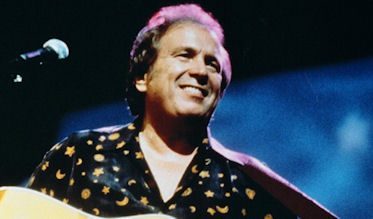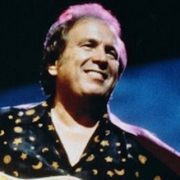Don McLean: The Night the Music Lived
Don McLean:
The Night the Music Lived
In Concert at the Saban Theatre
in Beverly Hills – December 13, 2013
 First we got hit on by a friendly alky who chatted us up with assurances that we were “the perfect couple; you look just beautiful together. Are you married?” We are friends, but flattery got him somewhere and Jill wound up buying him vodka—which ran up her own $4 bar tab by about $20. Welcome to Beverly Hills, where the stars come out in droves.
First we got hit on by a friendly alky who chatted us up with assurances that we were “the perfect couple; you look just beautiful together. Are you married?” We are friends, but flattery got him somewhere and Jill wound up buying him vodka—which ran up her own $4 bar tab by about $20. Welcome to Beverly Hills, where the stars come out in droves.
I didn’t see any folk singers, except for yours truly, but if you were there, you heard a great concert from someone who used to be a folk singer and then wrote a song about “the day the music died” that vaulted him into the upper echelons of pop superstardom. You may have heard it; indeed if you have lived anywhere near planet Earth in the past four decades and change you could not very well have missed it, since even Garth Brooks performs it in concert, and sang it on the National Mall for Obama’s Inauguration.
Something about a Chevy being driven to the levee, but the levee was dry (unlike our new friend from around the corner, who ginned up the best come on I have heard, pulled out a hundred dollar bill from his pocket, waved it in the air like there was plenty more where that came from, and yet somehow managed to get my concert companion to pay for his drink. No one short of O Henry could have invented his smooth tongue and silk manner.)
Don McLean’s American Pie is the song that saved Detroit. It put the American vernacular back on our tongues—with a homage to a car that was starting to sink beneath the waves of Japanese-made Toyotas, Hondas and Datsuns (remember them?) that were flooding the market in 1971, when it shot to the top of the charts. More than any government bailout could have done this guitar slinger from New Rochelle, New York put a song in our hearts that was inescapably tied to the fortunes of Detroit’s Big Three—Ford, GM and Chrysler. He gave them a fighting chance, and pulled a car that had become a punch line for every late night comic right out of their mouths and onto the Hit Parade. By the end of the 1970s Chevy was back on top. Let’s hear it for folk music!
When asked what his episodic rambling metaphoric rhapsody to American pop music from Buddy Holly to the Weavers to Bob Dylan to the Rolling Stones (well, not all-American) actually means, Don McLean said, “It means I don’t ever have to work again if I don’t want to.”
Fortunately for music fans everywhere, McLean still wants to, and puts on a show that has muscle, brains, heart and soul running through it from beginning to end—from a Buddy Holly song (Well All Right!) to his classic version of Roy Orbison and Joe Melson’s Crying (complete with falsetto) to his own major hits—And I Love You So, Vincent (anent which more anon) and the song that brought the audience to its feet at the end for a prolonged standing ovation, American Pie (inspired by Buddy Holly’s fatal plane crash in 1959) while we raised the roof on that crusty old “Temple of the Arts,” the Saban Theatre, by singing along on perhaps the greatest chorus ever written.
Don McLean is supported by a great touring band that has been with him for years as well, all of them topflight Nashville studio musicians: Tony Migliore (piano), David Smith (bass guitar), Jerry Kroon (drums) and Vip Vipperman (guitar). They can sure rock at full tilt when they have to, but like all great musicians they know when not to play.
One of the highlights of the show was when McLean was accompanied only by his pianist Tony Migliore on Henry Wadsworth Longfellow’s, I Heard the Bells on Christmas Day. McLean even let his great Martin D-45 sit this one out, so Migliore’s sublime piano playing became the only bells you heard—just beautiful.
Another sublime moment was the one we really came to hear—Don McLean’s touching, tender homage to Van Gogh, Vincent, most of which he played on solo acoustic guitar. Jill Fenimore recorded Vincent (aka Starry Starry Night) on her album Take Two and of course was looking forward to hearing his version live. We weren’t disappointed. Don McLean sang it beautifully and made the last rising notes on “perhaps they never will” truly glorious. On a trip to Amsterdam a few years ago Jill sang it (with her splendid guitar arrangement) in front of the Van Gogh Museum, so maybe Vincent’s ghost heard it too. If so, he must have been moved.
I brought a book to be autographed at the end of the concert, which Don McLean compiled, edited and annotated the year before he catapulted into superstardom, the songs he sang with Pete Seeger on the Sloop Clearwater in 1969 and 1970 when Pete helped launch the environmental movement by cleaning up the Hudson River one dock at a time.
It was the filthiest waterway in the entire country, having been turned into a sewer by both industrial and human waste. Pete built his log cabin on the Hudson back in 1949 and had been a sad witness to its slow decline. Finally, twenty years later he was inspired to do something about it, and built a replica of a 19th century whaling sloop—not to despoil the environment but to clean it up. It was christened the Clearwater and Pete and his friends sailed up and down the Hudson stopping along the way to sing and invite school children on board for a tour and some education on what was needed to restore the Hudson to its former pristine beauty. The goal was to be able to eventually take down the signs that warned inhabitants of its shores not to swim in its water or eat fish that had been caught in it. They inspired not only musicians like Don McLean and my late dear friend “Banjo” Fred Starner to join them, but environmentalists who had the technological and engineering skill to make their dreams a reality. One year later the first Earth Day was announced—on April 22, 1970. Indeed they did at least partially restore the Hudson’s lost luster, and those signs were taken down. I climbed aboard in 1976.
Don McLean was visibly moved to see his old book again, and to see how it had been treasured and used these many years after he had left a lasting musical legacy for the banjo players like Pete and Fred and guitar pickers like himself who became Seeger’s first crewmates on this quixotic odyssey to make Pete’s “Golden River” sparkle once again. He signed it with relish and dated it for me too; now it’s a keepsake extraordinaire.
While Don McLean has sailed far beyond the horizons of the typical folk singer from the 1960s, he has not abandoned his roots at all. He sat down in the middle of the show and paid tribute to the music that launched him on his journey—the Weavers, Josh White, and Sonny Terry and Brownie McGee (with whom he played at Ed Pearl’s legendary folk club the Ash Grove.) To make the journey complete he sang Bessie Smith’s Backwater Blues, with a lovely acoustic blues guitar accompaniment that shone throughout his band’s dynamic solos, giving each remarkable musician a turn in the spotlight.
No video screens, no light show, just pure American music—played and sung by a great American troubadour, Don McLean. I will always think of it as the night the music lived.
Ross Altman may be reached at greygoosemusic@aol.com













